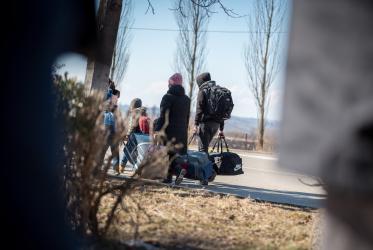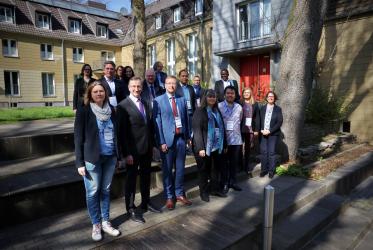Abuom expressed her real admiration and regard for the life and work of the Reformed Churches of Switzerland. “And as a lay Christian striving to be a faithful disciple of Jesus in these trying times, I relish this opportunity to reflect with you on what that really means today,” said Abuom. “As the WCC approaches 75 years, we can see in that long arc a continuity of aims yet also dramatic development.”
The ecumenical movement remains a movement for true renewal of the churches and in the world, said Abuom. “The heart of our fellowship—as churches and beyond—will always be the ecumenical spirituality we share: Our faith in God, as we find it revealed and incarnate in Jesus, is the flame that unites us and fuels our drive for justice and sparks our work for peace,” she said. “Since its last assembly, in 2013, the WCC has seen itself and the churches themselves as on a kind of pilgrimage, that is, a journey of faith, a sacred sojourn, in which we search for and attempt to practice justice and peace in the world.”
The Pilgrimage of Justice and Peace has proved an enormously fruitful paradigm, continued Abuom. “Sometimes the pilgrimage has become visible in real physical pilgrimages, like the several groups whose pilgrimages from Africa and Scandinavia converged on the Paris climate meeting in 2015,” she explained. “But most of all, the Pilgrimage of Justice and Peace has nurtured a spiritual bond among the churches, such that they see their work for justice and peace as part of a larger, indeed global, effort to discern and follow the gospel’s mandates to be peacemakers and justice seekers.“
The pandemic has increased our resolve, said Abuom. “It has brought us all to tears, and to our knees,” she said. “It has sharpened our understanding of all these issues, as it revealed and then exacerbated inequities and systemic injustices, and endangered standards of good governance (and even truth),” she said. “The work of the churches, traditional guardians of health and healing, as well as sites of lament and consolation, is now seen as more important, more relevant than ever.”
We now feel more keenly the vulnerability of our lives and all humans, Abuom added. “Such indeed is our situation, and the need for full engagement by Christians and Christian churches could not be plainer or more urgent,” she said. “Today’s ecumenical forefront lies in protecting human life and human dignity in this time of peril.”
As Christians, we are to be bearers of God’s love, she concluded. “As churches, we are to become communities and agents of reconciliation,” she said. “I believe that in this pivotal time the world desperately needs a movement, force or element for change that is not self-serving, nor discriminatory, nor provincial or ideological.”






